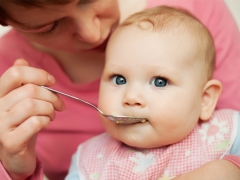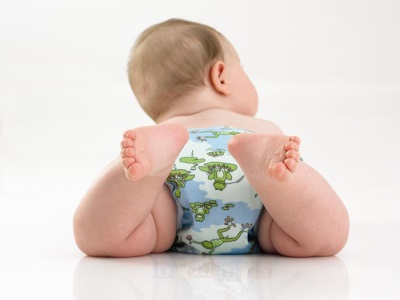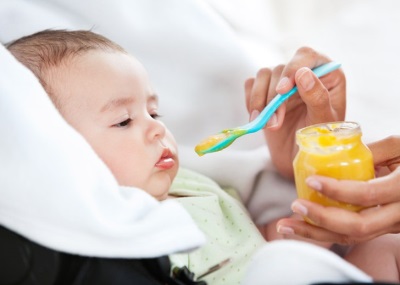Constipation in a child after complementary feeding
The child's age will react to each new product of complementary food, influenced by the age of the baby, and the characteristics of the product itself. Sometimes the introduction of complementary foods helps to cope with constipation in babies on artificial feeding, but quite a common problem is the development of constipation, as a reaction to complementary foods.
Signs of
When a child begins to receive complementary foods (porridge, fruit purees, vegetable dishes), his fecal masses become more dense and decorated. In infants younger than three years old, the normal stool frequency after complementary feeding is emptying five to six times a week. If a child poops less frequently and this causes him discomfort, then we can talk about constipation.
Possible reasons
The reasons for a more solid stool consistency after the introduction of complementary foods are:
- Dietary changes. Even adults who move to another area, when there is a change in the usual menu, there may be problems with the chair. Therefore, for the crumbs, the body of which had previously had to digest only milk, complementary food is a serious change that affects digestion.
- The introduction of complementary foods before the deadlines. The sooner a baby gets an unusual dish, the harder it will be for his digestive tract to digest a new product.
- Start feeding on dairy products. It is this kind of food, especially introduced into the baby’s diet ahead of time, that provokes constipation.
- Early introduction of protein foods complementary foods. The baby’s digestive tract cannot cope with fairly heavy protein foods at an early age and reacts to constipation.
- Lack of fluid in the diet of crumbs. When the baby is given complementary foods, the child should also begin to be fed. If it is not so important for the baby that receives breast milk (the baby can get liquid from the mother's milk), then for an artificial baby the lack of liquid can cause constipation.
- Food allergies. It can manifest itself in various disorders of the digestive function, including constipation.
- Failure of diet. It is recommended to give the baby food in the set time, then his digestive tract will be better able to cope with the digestion of food.
- Long stay in bed and lack of movement.
- Use of certain drugs - sorbents, iron preparations, calcium salts and others.
- Psychological suppression of the desire to poop due to stress or pain with anal fissures.
How to help?
Parents of the baby, whose constipation started constipation, are recommended:
- If the product was introduced to a baby at the age of less than 6 months, complementary foods should be completely abolished and wait.
- If dairy products provoked constipation, they should be excluded from the infant's diet, and if the stool has improved, try to enter at a later age. If, after 6 months, the child continues to develop constipation after consuming dairy products, they should be excluded before the age of one.
- If the cause of constipation is not dairy products, introduced into the diet of the crumbs older than 6 months, the lure is temporarily canceled and then injected very slowly, starting with minimal amounts. One product should be added to the child’s diet, and the baby’s chair should be monitored.
- To alleviate the condition of the baby with constipation, it is recommended to give mashed potatoes and juices from apples, peaches, prunes, apricots.These fruits contain a lot of dietary fiber, which helps to retain water in the feces for a softer texture.
- If a baby eats porridge, then products in which there is little fiber (rice, semolina) should be replaced with cereals, in which there is more food fiber (oatmeal, buckwheat).
- Massage the child's belly, and also do such an exercise - pull the knee-bent legs of the baby to his tummy.
Do I need an enema?
Enema is a very radical method recommended in the case when no other actions have helped. So first you should try to cope with constipation in other ways - normalization of nutrition, changes in the drinking regimen, massage of the tummy.
An alternative to enema can also be the introduction of candles, helping the baby to empty, but their use should be rare. On the use of such candles is recommended to talk with a pediatrician. Never need to give baby laxatives without a doctor's appointment.
When is a doctor's consultation necessary?
- If you enter the foods in the diet of the child correctly, and the baby still reacts to them with hard feces, you should go with the baby to the pediatrician to exclude diseases that are manifested by constipation.
- It is necessary to go with the baby to a specialist even with long (longer than 4 days) and often recurring constipations.
- Also, be sure to talk with your doctor if constipation has occurred suddenly and in cases where this problem is accompanied by fever and pain.
Prevention
- Do not rush to increase the portion of prikorma.
- Begin to introduce products should be in the form of one-component dishes.
- Provide your child with an optimal drinking regimen.
- Adhere to the diet, giving the child in the morning one kind of complementary foods, and at another time of day - another.
- Avoid consuming constipating foods in large quantities - bananas, rice, carrots, and dairy products.
- Encourage your baby to move more - crawl, walk, run.










